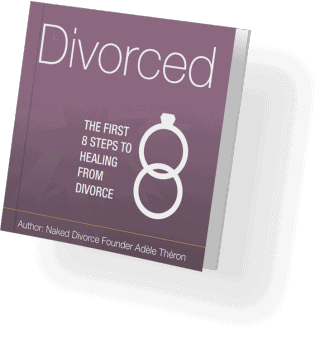
Free e-book: The First 8 Steps to healing from divorce
Contemplating Divorce? Here are Some Important Financial Considerations

My late good friend Hannah Foxley wrote a corker of an article on things to consider financially before divorcing.
She has sadly passed away since then but in her memory here are some tips written by her hand. Get ready for some good info… In the emotional haze of early divorce proceedings, it is often difficult to make clear decisions about what needs to be done immediately with regard to the finances. Here are seven important financial considerations you need to think about from the outset.
 You can get her book on Amazon:
You can get her book on Amazon:
The Wealthy Divorcee: A step-by-step guide to navigating the finances during and after divorce
by Better World Books
Get to grips with the finances
It will be very tempting to put your head in the sand and not deal with finances but this will cost you more in the long run in both time and costs. Get an understanding of income, outgoings and the assets and liabilities of the marriage.
Gather together copies of all of your paperwork as you will need these for the financial disclosure part of the proceedings. Paperwork that will need to be gathered includes:
- Bank Statements
- Savings account statements
- Mortgage statements
- Credit cards
- Personal loans
- Personal Pensions
- Employer pensions
- ISA’s
- Investment portfolios
- Investment bonds
- Life insurance
- Critical illness cover
- Income protection
- Medical insurance
- Trust documentation
- Share certificates
- Property information
- Business accounts
- Valuations of assets such as jewellery, art and other collectibles
- Anything else that has a value.
Detach yourself emotionally from finances
This is very difficult to do when you are in an emotional haze, but you must see the financial agreements as a business transaction and not make decisions based on emotion. Don’t try and use money to punish your husband as it won’t work and will cost more in the long run.
Get a copy of your credit file
It is really important to understand what is on your credit file. Issues with credit can affect your ability to get a mortgage and other credit in the future and it can sometimes unearth borrowing that you were not aware of or forgot you had.
It is important to close down any credit cards or bank accounts that you no longer use as having too many credit accounts can affect your ability to borrow more. It is also important to close down joint accounts and joint borrowing where possible and to do this as quickly as you can as you are both liable for the whole of any debt taken in joint names.
Change insurance policies from joint to single names
If you have joint life, critical illness, medical or other insurance policies you need to either have them changed to single names or set up new ones in your own name. As joint policyholders, the surviving spouse would benefit from the proceeds of the policy and you may not want this now that you have separated.
Check trust documentation
It is likely that you and your spouse are the joint trustees of any trusts that you have set up during the marriage and if you don’t want to this to be the case going forward, you will need to change the trustees (subject to the type of trust).
Likewise, if you are beneficiaries of each others trusts, you may want to change this (subject to the type of trust). The Financial Conduct Authority does not regulate trusts.
Make a new will
You will need to ensure that your Will reflects your new wishes. You will need to agree with your spouse what will happen to the children and make these wishes clear as well as your financial wishes.
Timing of your separation
You have until the end of the tax year in which you separate from your husband to transfer assets between each other without there being potential capital gains tax issue. If at all possible, don’t separate right before the end of tax year as you will lose this valuable benefit.
Getting to grips with some of these financial decisions early will mean less cost and stress later on. It is important to consider a financial advisor as part of your divorce team who can work alongside your legal representative.
If you enjoyed this post, I’d be very grateful if you’d help it spread by emailing it to a friend, or sharing it on Twitter or Facebook.
With you in service

 Book a Clarity Call for any divorce or break up support you need,
Book a Clarity Call for any divorce or break up support you need,

